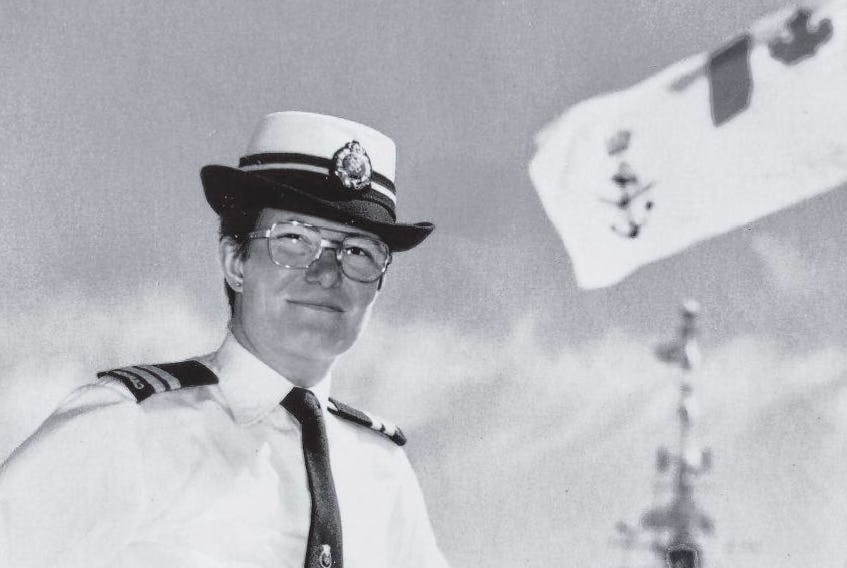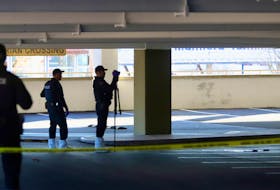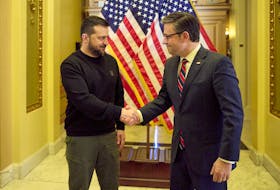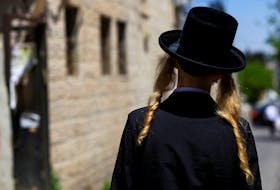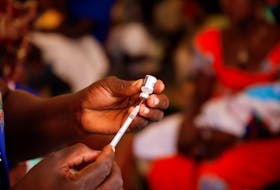Courtney Dunne was 16 when she joined the Canadian Forces with dreams of becoming a weapons technician.
She had been in uniform all of 10 days when two of her fellow reservists raped her in 2012.
“From that point on, I was known as the girl who cried rape,” she said.
Dunne, now 22, has been out of the military for almost two years. But she still bears emotional scars from her time in uniform.
She suffers from post-traumatic stress disorder, and once tried to take her own life.
Dunne said she’s doing better these days. She’s studying to become a rehabilitation assistant in her home province of Newfoundland and Labrador, and is taking jiu-jitsu classes for selfdefence “just in case someone happens to come around,” she said.
“After I was released, I found it hard because I always wanted to be a soldier, and then it turns out the one dream you had was not what you expect,” she said. “I thought the military was safe. I trusted the uniform.”
Dunne has spoken out frequently about her experiences in the military to the media and during her run in in the Miss Newfoundland and Labrador pageant in 2015. Today, she is using her voice to try and empower other survivors.
After being sexually assaulted, Dunne said she tried to bring the men responsible to justice, but said she was essentially ignored.
In fact, because Dunne admitted to having a beer the night of the assault, she got a fine for underage drinking, as did the men who raped her.
“The way the military handled it, the guy who assaulted me was sleeping 10 feet across the hall from me, so I didn’t get to sleep until I was medically released from that course,” she said.
Unfortunately, Dunne’s experiences with sexual harassment in the military did not stop with her rape.
When she was on course in 2013, four men broke into her room and tried to pull her out of bed. When she reported it to her chain of command, Dunne said she was told she was “creating a name for herself ” and that she should behave.
Dunne eventually stopped trying to report situations where she was threatened or harassed.
“I had one guy who was on my course look at me and say ‘Yeah, I would rape you, and I’m going to do it tonight.’ I didn’t bring that forward, I locked the door and stayed awake the whole night prepared for a fight.”
Another woman, a military medic in her mid-20s who asked that her name not be used, told The Chronicle Herald that her experiences with harassment began on her first day in uniform. She remembers being 17 in basic training and having her instructors — men in their 30s — make inappropriate comments about her flexibility and chest size.
“It’s this general mentality of ‘Well, what can I do about it? All my instructors are doing it.’ I didn’t really have anyone I could go to and say, ‘Hey I’m not OK with this,’” she said.
A few years into her military career she was sexually assaulted by a sergeant while she was recovering from an injury.
“He pinned me down and raped me knowing I couldn’t fight back,” she said.
Word of the rape, which prolonged her recovery time, got around to her peers, which led to more harassment.
“I kept getting these comments, like ‘Oh yeah, he must have really given it to you.’ That kind of stuff,” she said.
After she reported the incident, her attacker was voluntarily released from the military. She said there was a lot of back and forth over who should handle the complaint, the military or local police. But no criminal charges were ever laid.
“It turned into this game of hot potato as to who would deal with it, and the potato kind of rolled on the floor and never got picked up,” she said.
These cases are shocking but they’re not unique:
An in-depth look at sexual assault in the military by Statistics Canada from 2016 found that female regular force members were four times more likely than males to report being sexually assaulted. An earlier report led by former Supreme Court Justice Marie Deschamps found that that the Canadian military had a widespread underlying sexualized culture and that a large portion of sexual assaults were not reported for fear of repercussions.
Women currently make up about 15 per cent of the Canadian Forces. Efforts are being made to increase that number to 25 per cent by 2026 — a goal officially adopted by the military in 2016.
To that end, the military launched Operation Honour in 2015, described as “a mission to eliminate harmful and inappropriate sexual behaviour,' and created the Sexual Misconduct Response Centre to support members who have been affected by such behaviour.
The Canadian Forces says that since 2015 the percentage of charges related to sexual assault has nearly tripled from 11 to 31 per cent of all charges laid by military police. Overall reporting of sexual misconduct incidents have also doubled, “showing increased comfort with coming forward and reporting incidents to military police and the chain of command.”
Speaking with The Chronicle Herald, Brig.-Gen. Virginia Tattersall, deputy commander of Military Personnel Generation, outlined multiple ways the Canadian Forces is attempting to create an inclusive environment including gender-neutral testing, uniforms tailored to the female physiology, and equal pay.
But Tattersall said, along with making the Forces more accessible for women, the military has to show the Canadian public that it is a safe place to serve.
Tattersall said the military investigates and records all complaints of sexual misconduct, and if allegations are proved, appropriate action is taken.
“We are taking those steps to change the culture, though culture is not something that changes overnight,” she said.
Studies including the Statistics Canada survey and the Deschamps report have proved to be a wakeup call for the military, said Maya Eichler, a professor at Mount Saint Vincent University who does research in the area of gender integration in the Canadian military.
But trying to achieve any meaningful change in culture is going to be a lengthy process, she said.
“One has to be aware of the legacy of the military as a gendered organization and for how many decades there has been both overt and implicit genderdiscrimination,” she said.
“Obviously, it’s a broader societal problem and not just a military problem. At the same time we have a responsibility to change the institution.”
Retired lieutenant Louise Fish was the first woman to serve as a naval officer at sea and was one of the first women to serve in previously all-male naval units. She wore the navy uniform between 1974 and 1998.
Not only was there severe pushback from her peers along with overt sexism because she served in a traditionally male role, Fish said she experienced constant sexual harassment.
“From low-level comments to outright sexual assault, all the time, at all levels,” she said, adding that it only subsided as she rose in the ranks.
“You’re dealing with an iconic cultural establishment that is going to change very very slowly,” Fish said, adding that things like the #MeToo movement are helping to advance an overall culture shift.
“It’s part of the wider society. All the blame doesn’t go on the military. Every single one of those guys who call it ‘operation hop on her’ are local guys from Ottawa or Halifax or whatever. They’re just Canadians. They’ve come through the school system and they go into the military. . . . It’s just that in those militaristic organizations, it’s easier to enshrine it in their very being.”
In the past, Eichler said, external pressure was the only way to prompt real change in the military regarding inclusion and treatment of women.
“Over the last decades, it’s always been media, civil society and legal pressures that have brought about any change. Right now the military is mostly trying to change itself through Operation Honour, and it’s focusing mostly on better understanding the problem, offering better support to victims of sexual harassment and assault, and trying to prevent harassment and assault. But it’s not really being held to account externally. I think what would be needed is much stronger external accountability.”
That’s part of the reason why young women like Dunne are finally speaking up about their experiences.
She hopes to shed some light on the situation by sharing her story and maybe helping contribute to the much-needed cultural shift in both civilian and military life.
“If people before my generation talked about it and fought about it, maybe I wouldn’t have had to go through it,” she said “But they didn’t, so I’m fighting for it now.”

